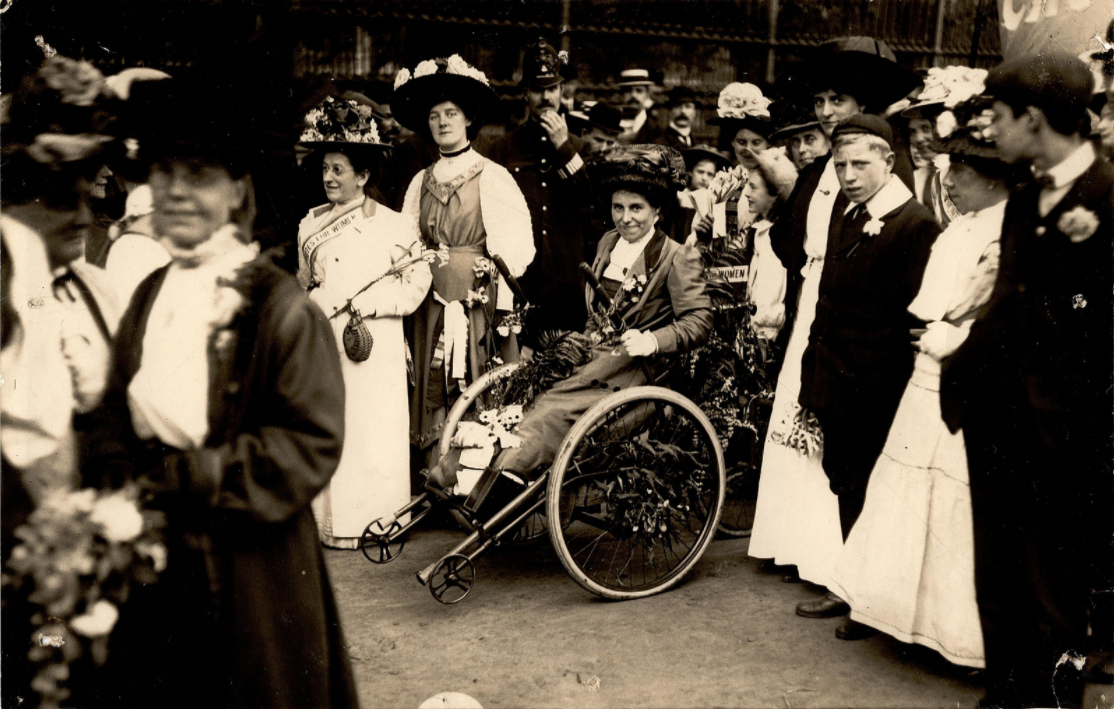6 February 2018 marks the centenary of the Representation of the People Act (1918) which allowed some women and all men the right to vote. It was to be a further ten years before all women achieved voting equality with men.
There are parallels between the history of the campaign for Women’s Suffrage and the Disabled People’s Movement. The Suffragists led by Millicent Fawcett and Emmeline Pankhurst’s Suffragettes took very different approaches to achieving their goal of emancipation. The Suffragists focussed on parliamentary lobbying and constitutional reform. The Suffragettes, frustrated with the lack of progress lived up to their motto of ‘deeds not words’ through acts of civil disobedience; landing many in jail and on hunger strike.
Similarly for the campaign for disability rights legislation: the large well-known charities supported the UK Government in focusing on methods of ‘persuasion’ rather than legislation to tackle recalcitrant employers. Identifying unemployment as just one issue where disabled people faced systematic discrimination, during the late 80s and 90s Disabled People’s Organisations spearheaded the campaign to introduce comprehensive and fully enforceable civil rights legislation. High profile lobbies of parliament and mass rallies in Trafalgar Square brought disabled people from across the UK out on the streets. Meanwhile, the Direct Action Network (DAN) highlighted the inaccessibility of public transport by undertaking Suffragette style shock tactics with disabled protestors handcuffing themselves to double-decker buses, gridlocking city centres across the land.
Whatever the strategies used, the campaign for equal rights is undoubtedly long and hard. Securing legislation does not automatically bring about equal pay or freedom from sexual harassment. Nor did the 1995 Disability Discrimination Act instantly remove barriers. Disabled people have the vote but many are prevented from exercising it due to lack of access to information or indeed to the polling booth itself. The 36% disability employment gap in Wales hasn’t budged in years and securing a place in mainstream schools remains a battle for many parents of disabled children.
Moreover mass civil rights movements can overlook the specific experiences of individuals who face multiple forms of discrimination. For example, the specific barriers faced by disabled women have not necessarily enjoyed prominence either within the Women’s or the Disabled People’s Movements.
As part of the Centenary celebrations, funding from the Fawcett Society and Spirit of 2012 has enabled Disability Wales to highlight the achievements of D/deaf and disabled women through our project Embolden: Spirit of Disabled Women. Three workshops, held in Cardiff, Haverfordwest and Wrexham enabled D/deaf and disabled women to explore issues in common, through which an online campaign is emerging: #DisabledWomenMatter
At the Senedd on 13 March, Embolden will culminate with an event sponsored by Joyce Watson AM. It will showcase the achievements of the eight #IamEmbolden Ambassadors shortlisted from forty-three nominations from across Wales, celebrating what D/deaf and disabled women are contributing at all levels in communities, workplaces, arts, sport and education.
Power is not given up easily. Centenaries and celebrations afford us a ‘welcome break’ to reflect on our achievements both collectively and individually and to renew our energy and sustain us as we march ever onwards towards full rights and equality.
Rhian Davies
Chief Executive of Disability Wales
Tags:



